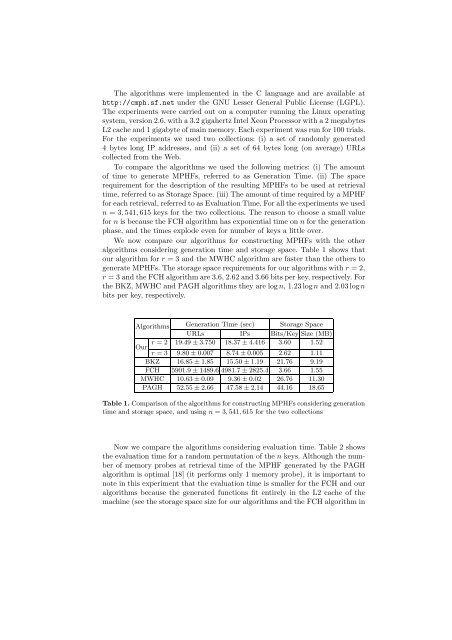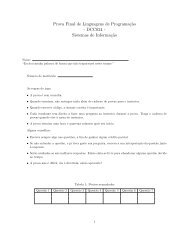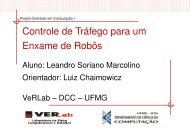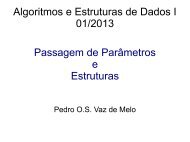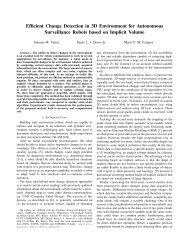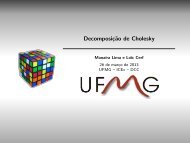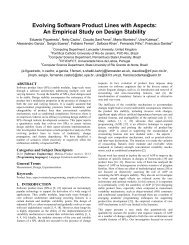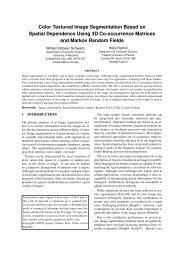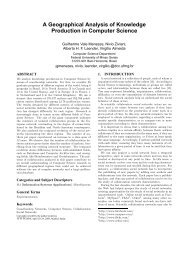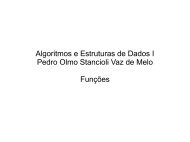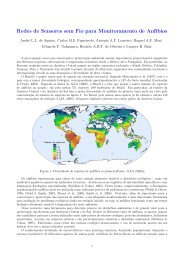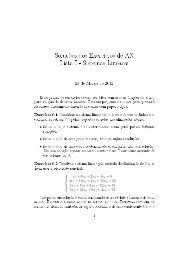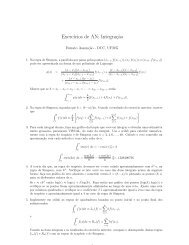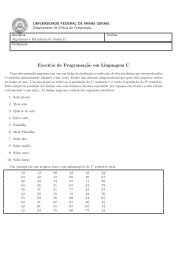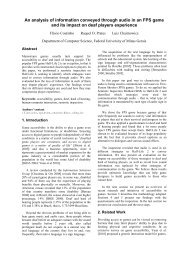Simple and Space-Efficient Minimal Perfect Hash Functions * - Liacs
Simple and Space-Efficient Minimal Perfect Hash Functions * - Liacs
Simple and Space-Efficient Minimal Perfect Hash Functions * - Liacs
You also want an ePaper? Increase the reach of your titles
YUMPU automatically turns print PDFs into web optimized ePapers that Google loves.
The algorithms were implemented in the C language <strong>and</strong> are available at<br />
http://cmph.sf.net under the GNU Lesser General Public License (LGPL).<br />
The experiments were carried out on a computer running the Linux operating<br />
system, version 2.6, with a 3.2 gigahertz Intel Xeon Processor with a 2 megabytes<br />
L2 cache <strong>and</strong> 1 gigabyte of main memory. Each experiment was run for 100 trials.<br />
For the experiments we used two collections: (i) a set of r<strong>and</strong>omly generated<br />
4 bytes long IP addresses, <strong>and</strong> (ii) a set of 64 bytes long (on average) URLs<br />
collected from the Web.<br />
To compare the algorithms we used the following metrics: (i) The amount<br />
of time to generate MPHFs, referred to as Generation Time. (ii) The space<br />
requirement for the description of the resulting MPHFs to be used at retrieval<br />
time, referred to as Storage <strong>Space</strong>. (iii) The amount of time required by a MPHF<br />
for each retrieval, referred to as Evaluation Time. For all the experiments we used<br />
n = 3, 541, 615 keys for the two collections. The reason to choose a small value<br />
for n is because the FCH algorithm has exponential time on n for the generation<br />
phase, <strong>and</strong> the times explode even for number of keys a little over.<br />
We now compare our algorithms for constructing MPHFs with the other<br />
algorithms considering generation time <strong>and</strong> storage space. Table 1 shows that<br />
our algorithm for r = 3 <strong>and</strong> the MWHC algorithm are faster than the others to<br />
generate MPHFs. The storage space requirements for our algorithms with r = 2,<br />
r = 3 <strong>and</strong> the FCH algorithm are 3.6, 2.62 <strong>and</strong> 3.66 bits per key, respectively. For<br />
the BKZ, MWHC <strong>and</strong> PAGH algorithms they are log n, 1.23 logn <strong>and</strong> 2.03 logn<br />
bits per key, respectively.<br />
Algorithms Generation Time (sec) Storage <strong>Space</strong><br />
URLs IPs Bits/Key Size (MB)<br />
r = 2<br />
Our<br />
r = 3<br />
19.49 ± 3.750<br />
9.80 ± 0.007<br />
18.37 ± 4.416<br />
8.74 ± 0.005<br />
3.60<br />
2.62<br />
1.52<br />
1.11<br />
BKZ 16.85 ± 1.85 15.50 ± 1.19 21.76 9.19<br />
FCH 5901.9 ± 1489.6 4981.7 ± 2825.4 3.66 1.55<br />
MWHC 10.63 ± 0.09 9.36 ± 0.02 26.76 11.30<br />
PAGH 52.55 ± 2.66 47.58 ± 2.14 44.16 18.65<br />
Table 1. Comparison of the algorithms for constructing MPHFs considering generation<br />
time <strong>and</strong> storage space, <strong>and</strong> using n = 3, 541, 615 for the two collections<br />
Now we compare the algorithms considering evaluation time. Table 2 shows<br />
the evaluation time for a r<strong>and</strong>om permutation of the n keys. Although the number<br />
of memory probes at retrieval time of the MPHF generated by the PAGH<br />
algorithm is optimal [18] (it performs only 1 memory probe), it is important to<br />
note in this experiment that the evaluation time is smaller for the FCH <strong>and</strong> our<br />
algorithms because the generated functions fit entirely in the L2 cache of the<br />
machine (see the storage space size for our algorithms <strong>and</strong> the FCH algorithm in


